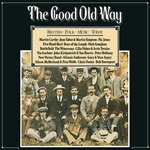> Folk Music > Records > Various Artists: The Good Old Way
The Good Old Way
 |
The Good Old Way Topic Records TPSS412 (LP, UK, 1980) |
A TWOTONES Production;
Mastered by Tim Young, CBS Studios;
Design and notes by Tony Russell
Tracks
Side 1
- June Tabor with Martin Simpson:
Heather Down the Moor
from A Cut Above (12TS410, 1980) - Martin Carthy:
Lovely Joan
from Because It’s There (12TS389, 1979) - Battlefield Band:
The Battle of Falkirk Muir
from Stand Easy (12TS404, 1979) - Dick Gaughan:
Bonnie Jeannie o’ Bethelie
from Gaughan (12TS384, 1978) - Boys of the Lough:
Polkas: I’ll Buy Boots for Maggie / O’Connor’s Polka
from Regrouped (12TS409, 1980) - Chris Foster:
Jack the Sailor
from Layers (12TS329, 1977) - John Kirkpatrick and Sue Harris:
Crocker’s Reel
from Facing the Music (12TS408, 1980) - The Watersons:
The Good Old Way
(Roud 23864)
from For Pence and Spicy Ale (12TS265, 1975) - Alison McMorland and Peta Webb:
The Convict’s Song
(Roud 5122)
from Alison McMorland & Peta Webb (12TS403, 1980) - Bob Davenport:
The Blarney Stone
from Down the Long Road (12TS274, 1975)
Side 2
- Nic Jones:
Canadee-I-O
from Penguin Eggs (12TS411, 1980) - Cilla Fisher and Artie Trezise:
Norland Wind
from Cilla & Artie (12TS405, 1979) - Alistair Anderson:
Hold On / Miss Fenwick’s Reel / Lads of Leith / Up and Run Away
from Dookin’ for Apples (12TS402, 1979) - Five Hand Reel:
Paddy’s Green Shamrock Shore
(Roud 1419; Henry H192)
from A Bunch of Fives (12TS406, 1979) - Peter Bellamy:
Barbaree
from Both Sides Then (12TS400, 1979) - Vin Garbutt:
Photographic Memory
from Tossin’ a Wobbler (12TS385, 1978) - Gary & Vera Aspey:
King Cotton
from From the North (12TS255, 1975) - New Victory Band:
Polkas: Harper’s Frolic / Bonny Kate
from One More Dance & Then (12TS382, 1978)
Sleeve Notes
The Good Old Way is a collection of songs and tunes by some of the leading figures in British folk music. We hope that as well as being an enjoyable hour’s worth of music it gives an impression of thegreat range of ideas and approaches found among today’s folk artists.
Folk music has not always been valued enough for its sheer diversity. Popular images of the singer, or of the club where he or she performs, tend to be stereotypes, mostly of a kind that does justice to neither. In fact the folk singer is sometimes a remarkable person, and the folk club is certainly a remarkable institution.
Remarkable not because the entertaiment it offers is necessarily inexpensive, or well presented, or even especially good, though often it’s all of these. It is direct, intimate, personal - but, above all, it is diverse. The folk club is one of the sturdiest shelters of both regional differences and personal singularity. Folk singers, at their best, are unashamedly and irretrievable from somewhere. Their songs and stances are rooted in specific communities and express a particular character.
We believe this is something to be kept and enjoyed, something valuable to the community as a whole precisely because it doesn’t grow from the community as a whole. The record deliberately takes a sweeping view, but it all the time reminds us that what makes folk music eloquent is that it speaks in a dozen accents at once.
(Tony Russell)

